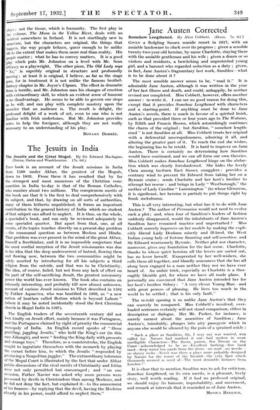The Jesuits in India
The Jesuits and the Great Mogul. By Sir Edward Maclagan. (Burns, Oates and Washbourne. 17s. 6d.) Tins book is an account of the Jesuit missions in India from 1580 under Akbar, the greatest of the Moguls, down to 1803. From these it has resulted that by far the strongest and most numerous of the Christian com- munities in India to-day is that of the Roman Catholics, who number about two millions. The conspicuous merits of this book are that it is the first to deal comprehensively with its subject, and that, by drawing on all sorts of authorities, many of them hitherto unpublished, it forms an important contribution to the general history of India which no student of that subject can afford to neglect. It is thus, on the whole, a specialist's book, and can only be reviewed adequately in some specialist quarter. But apart from that, one, at all events, of its topics touches directly on a present-day problem --the communal question as between Moslem and Hindu. That problem was ever present in the mind. of the great Akbar, himself a freethinker, and it is no impossible conjecture that his most cordial reception of the Jesuit missionaries was due to his idea that the deep undercurrent of hatred, flowing then and flowing now, between the two communities might be safely averted by introducing for all his subjects a third religion from the outside, and that was to be Christianity. The idea, of course, failed, but not from any lack of effort on the part of the self-sacrificing Jesuit, the greatest missionary power the world has ever known. The book also contains an intensely interesting, and probably till now almost unknown, account of various Jesuit missions to Tibet described in 1582 by Father Aquaviva, who was beatified in 1893, as " a new nation of heathen called Bottan which • is beyond Lahore " (where it may be noted incidentally stood the first Christian church in Mogul India in 1597).
The English traders of the seventeenth century did not look kindly on Jesuit effort, mainly because it was Portuguese, and the Portuguese claimed by right of priority the commercial monopoly of India. An English record speaks of " those prattling, juggling Jesuits," who held the King's ear (in this ease Jihangir), and were " feeding the King daily with presents and strange toys." Therefore, as a counterstroke, the English sought to ingratiate themselves with the monarch by playing the cornet before him, to which the Jesuits " responded by producing a Neapolitan juggler." The extraordinary tolerance of the Mogul. Court is illustrated by the fact that under Abkar public discussions of the rival merits of Christianity and Islam were not only permitted but 'encouraged ; and " on one occasion, Father Xavier was asked why more persons were possessed by devils in Christendom than among Moslems, and he did not deny the fact, but explained it—to tha amusement of his hearers—by replying that the devil, having the Moslems already in his power, could afford to neglect them."






























 Previous page
Previous page